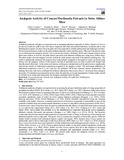Analgesic Activity of Conyza Floribunda Extracts in Swiss Albino Mice

View/
Date
2021-06-30Author
Opiyo, Sylvia A.
Muna, Kennedy K.
Ndirangu, Ephantus G.
Metadata
Show full item recordAbstract
Traditional medicine still plays an important role in managing infections especially in Africa. Extracts of Conyza floribunda Kunth are used to treat sore throat, ringworm and other skin related infections, toothache and to stop bleeding from injuries. Extracts from the plant have been reported to exhibit antibacterial and antifungal activities. Previous phytochemical studies on the plant yielded terpenoid, sterols and flavonoids. The aim of the present study was to determine the analgesic activity Conyza floribunda extracts. Methanol, DCM and n-hexane extracts of the plant were subjects to toxicity, hot plate latency and acetic acid induced-writhing tests using Swiss Albino Mice. The plant extract showed analgesic activity in both hot plate latency and acetic acid induced-writhing tests. The extracts significantly increased the response time in the animals compared to the negative control. In the hot plate latency test, the analgesic activity of the extracts and that of morphine rose over time to peak at 90 minutes and then decreased afterwards. In the acetic acid-induces writhing test, administration of the plant extracts significantly reduced the number of abdominal contractions compared to the negative control. The percentage inhibitions of abdominal contractions were 67.2, 46.5 and 39.4 for methanol, DCM and n-hexane extracts respectively. The findings from this study have confirmed the folkloric information that extracts from C. floribunda have analgesic properties. We therefore recommend the extracts from the plant for use in pain management. Further studies should be carried out to isolate and characterize the analgesic principles from the plant.
Collections
- Journal Articles (PAS) [273]
